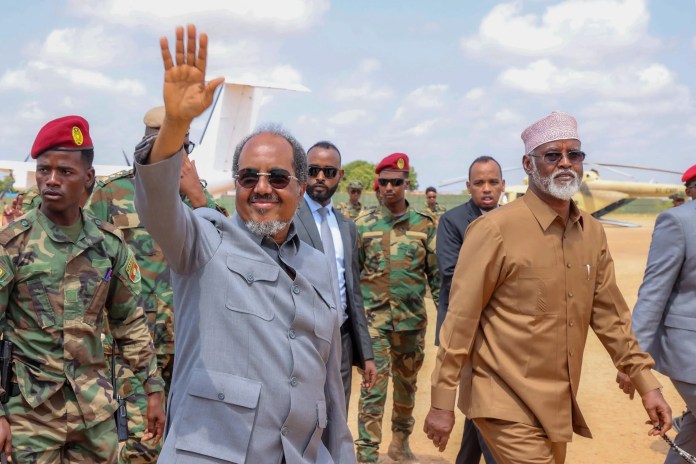KISMAYO, Somalia – Somali President Hassan Sheikh Mohamud arrived in the strategic port city of Kismayo on Saturday for crucial talks with Jubaland state leader Ahmed Madobe, aiming to resolve a year-long political crisis that has fractured relations and sparked deadly clashes.
The visit marks a significant attempt at de-escalation after a standoff that has paralyzed cooperation between the federal government in Mogadishu and the vital southern state of Jubaland.
The dispute has also drawn in regional powers, with diplomatic sources confirming that delegations from neighboring Ethiopia and Kenya are in Kismayo to help mediate the talks.
Official statements on the progress of the closed-door meetings have been cautious.
“Further meetings are ongoing between the two leaders,” Jubaland’s Information Minister, Abdifitah Mohamed Mukhtar, told reporters. “We will share the outcome with you once the dialogue is complete, but for now, there is nothing we can announce.”
A year of “illegal” rule
The crisis erupted in early 2024 after Jubaland proceeded with its presidential election, defying Mogadishu. The re-election of Ahmed Madobe for a third term was immediately declared “illegal” by the Federal Government of Somalia (FGS).
Mogadishu argued that Madobe’s candidacy violated Jubaland’s own constitution, which allegedly limits a president to two terms. The federal cabinet swiftly nullified the election results, branding Madobe a “former leader” and calling for his prosecution.
“The Council of Ministers instructs the Attorney General of the Federal Government of Somalia to act urgently on filing a case with the Supreme Court against all actions taken by Ahmed Madobe that are inconsistent with the country’s election laws,” a government resolution stated at the time.
The political feud rapidly escalated. On November 10, 2024, the Jubaland administration announced it was severing all working ties with the federal government, accusing it of undermining the state’s autonomy.
Tensions spilled over into armed conflict. Both sides accused each other of amassing troops in the Gedo region, a volatile area along the Kenyan and Ethiopian borders. In July of this year, clashes between federal forces and Jubaland troops erupted in the border town of Beled Hawo, resulting in casualties and significant property damage.
This military confrontation underscored the dangerous potential of the political impasse, threatening to destabilize a region already grappling with a persistent insurgency from the al-Shabaab militant group.
Regional powers mediate
The presence of Kenyan and Ethiopian delegations underscores the strategic importance of Jubaland, serving as a critical buffer zone between Somalia’s heartland and the borders of its powerful neighbors.
Kenya, in particular, has long maintained a close relationship with Ahmed Madobe’s administration as part of its security strategy to counter al-Shabaab incursions.
Prior to this formal summit, a group of senior Kenyan politicians, including former envoy to Somalia Mohamed Abdi Affey, were reportedly involved in informal shuttle diplomacy to bring the two sides to the table.
Both Nairobi and Addis Ababa have a vested interest in a stable and unified Somali front against Islamist militants, a fight that internal political divisions undermine.
Analysts contend that the Jubaland dispute is a symptom of a deeper, systemic power struggle over the nature of Somalia’s federal system. The conflict is less about individuals and more about the unresolved questions of power and resource sharing between the central government and the Federal Member States.
“The real issues in contention in Somalia are not personalities, but the division of power between the federal and state levels,” said Mohamed Mukhtar, a Mogadishu-based political analyst.
“This isn’t limited to elections. When examining security, education, and all government institutions, constant disputes and disagreements arise over authority. That is the backdrop to this crisis.”
The standoff mirrors previous disputes, including a similar conflict between Madobe and the administration of former President Mohamed Abdullahi Farmaajo, underscoring the recurring challenges in implementing a stable federal model in Somalia.
As President Mohamud and Ahmed Madobe continue their discussions, the outcome could have profound implications for Somalia’s stability, the fight against al-Shabaab, and the very future of its fragile federal state.


